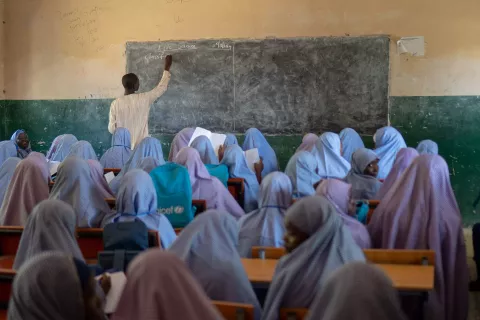Skills for women mean income for education
With investments in vocational training, UNICEF, with European Union (EU) funding, is boosting school enrolment in Borno towns

Two years after being forced to drop out of Gwoza Wakane Junior School in Borno State because she couldn’t afford a school uniform, 16-year-old Polina Gajawe now has something infinitely more valuable: a sewing machine and the skill to produce as many school uniforms as she wants.
“I'm returning to class once schools are reopened,” she said. “Before then, I will be sewing at the GSS IDP Camp to earn some money to support my mother.”Originally displaced from the nearby Fadagwe community, Gajawe is one of 60 young women in the towns of Gwoza and Monguno who are being supported with vocational skills and the chance to earn income and either return to school or see their children through school. She is beyond elated.
Funded by the European Union (EU), the UNICEF-supported project provides trainees with new sewing machines and the skills to sew and stitch.

Gajawe enrolled shortly after arriving in Gwoza and received training alongside 29 other teenagers and young women. Four months after enrolment, Gajawe can already sew skirts, shirts, trousers and dresses in several different styles.
Like Gajawe, Balkisu Alhaji Yaya also fled conflict. From Dalwa, a distant community in the Konduga local government area, she relocated to Gwoza and there learned first to produce school uniforms and then everyday clothes. Yaya, 20, has never been to school, but she plans to do so once she is able. She is also determined for her children to be educated, and plans to use the proceeds from her business to make that happen.
“I don’t think I will find it easy in school at my age. But I can earn money from this skill and buy books, pens and even feed my children. I can also sew their school uniforms at little or no cost,” she said. “I am grateful to UNICEF and hope this kind of project will continue so other people like me can benefit.”
Investment in parents has proven to be important in the effort to ensure access to education for every child, as children tend to enroll in and complete school when their parents can provide for their basic daily needs. By focusing on the families of the most disadvantaged children, UNICEF has consistently pursued improvement in access, retention and completion of basic education of children.
Another beneficiary, 24-year-old Amina Ndawa, believes she will soon start earning an income from her new skills. The divorced mother of two believes that being self-reliant will positively impact her children’s education.
“My plans are to ensure my children don’t end up like me. I did not proceed to secondary school after my primary education. I want them to have a better and quality education,” she says. “With my sewing machine, I believe my dreams will surely come true.”
Gajawe also has plans. Unlike many girls her age, they do not include marriage for now. Instead, she’s already taking a business approach to her sewing.
“Depending on the style, I will charge between N900 and N1,500 for a gown. I am hoping to get as many customers as possible,” she says. “I will continue to use the machine and skills learned to support my education and my mother.”




